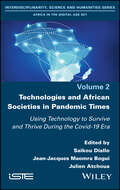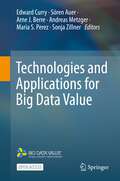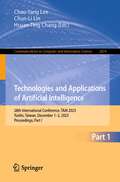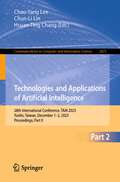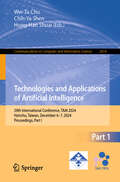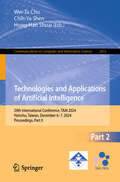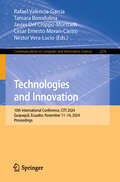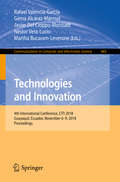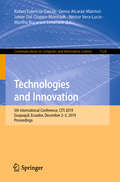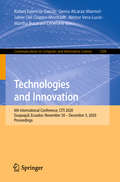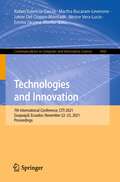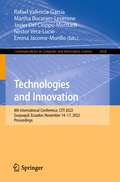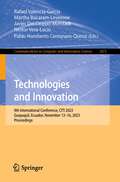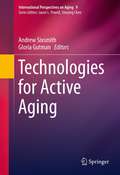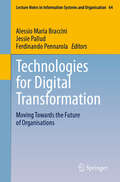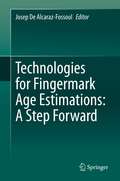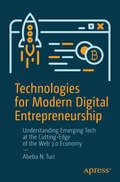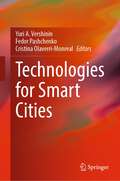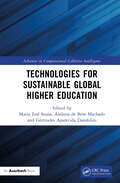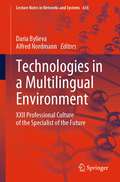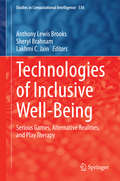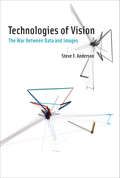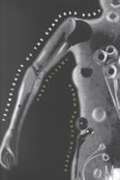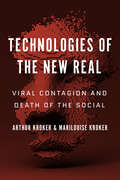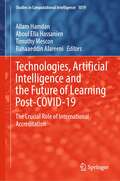- Table View
- List View
Technologies and African Societies in Pandemic Times: Using Technology to Survive and Thrive During the Covid-19 Era
by Saikou Diallo Julien Atchoua Jean-Jacques Maomra BoguiIn February 2020, the Coronavirus pandemic became a worldwide health emergency, and in April of that year, the ITU and the WHO created a joint declaration to show their commitment to using ICTs to overcome the pandemic. Technologies and African Societies in Pandemic Times explores the impact of Covid-19 on African societies in North and West Africa through the lens of technology and social media. The authors of this book highlight how everyday people dealt with the pandemic from its onset, through the process of the development of the vaccine and to its eventual dissemination. This book tells stories of survival, of coping and, eventually, of economically thriving. The authors also describe how, in this extremely challenging moment for humanity, people used music, art and social media to reinvent the community, to share joy and pain and to try to remain connected.
Technologies and Applications for Big Data Value
by Edward Curry Sören Auer Andreas Metzger Sonja Zillner Arne J. Berre Maria S. PerezThis open access book explores cutting-edge solutions and best practices for big data and data-driven AI applications for the data-driven economy. It provides the reader with a basis for understanding how technical issues can be overcome to offer real-world solutions to major industrial areas.The book starts with an introductory chapter that provides an overview of the book by positioning the following chapters in terms of their contributions to technology frameworks which are key elements of the Big Data Value Public-Private Partnership and the upcoming Partnership on AI, Data and Robotics. The remainder of the book is then arranged in two parts. The first part “Technologies and Methods” contains horizontal contributions of technologies and methods that enable data value chains to be applied in any sector. The second part “Processes and Applications” details experience reports and lessons from using big data and data-driven approaches in processes and applications. Its chapters are co-authored with industry experts and cover domains including health, law, finance, retail, manufacturing, mobility, and smart cities. Contributions emanate from the Big Data Value Public-Private Partnership and the Big Data Value Association, which have acted as the European data community's nucleus to bring together businesses with leading researchers to harness the value of data to benefit society, business, science, and industry.The book is of interest to two primary audiences, first, undergraduate and postgraduate students and researchers in various fields, including big data, data science, data engineering, and machine learning and AI. Second, practitioners and industry experts engaged in data-driven systems, software design and deployment projects who are interested in employing these advanced methods to address real-world problems.
Technologies and Applications of Artificial Intelligence: 28th International Conference, TAAI 2023, Yunlin, Taiwan, December 1–2, 2023, Proceedings, Part I (Communications in Computer and Information Science #2074)
by Chao-Yang Lee Chun-Li Lin Hsuan-Ting ChangThis book constitutes the proceedings of the 28th International Conference on Technologies and Applications of Artificial Intelligence, TAAI 2023, which was held in Yunlin, Taiwan, during December 1–2, 2023. `The 35 full papers and 12 short papers included in this book were carefully reviewed and selected from 193 submissions. The TAAI 2023 provides a platform for experts and scholars from domestic and international universities, research units, and industries to exchange AI technologies and application results.
Technologies and Applications of Artificial Intelligence: 28th International Conference, TAAI 2023, Yunlin, Taiwan, December 1–2, 2023, Proceedings, Part II (Communications in Computer and Information Science #2075)
by Chao-Yang Lee Chun-Li Lin Hsuan-Ting ChangThis book constitutes the proceedings of the 28th International Conference on Technologies and Applications of Artificial Intelligence, TAAI 2023, which was held in Yunlin, Taiwan, during December 1–2, 2023.The 35 full papers and 12 short papers included in this book were carefully reviewed and selected from 193 submissions. The TAAI 2023 provides a platform for experts and scholars from domestic and international universities, research units, and industries to exchange AI technologies and application results.
Technologies and Applications of Artificial Intelligence: 29th International Conference, TAAI 2024, Hsinchu, Taiwan, December 6–7, 2024, Proceedings, Part I (Communications in Computer and Information Science #2414)
by Wei-Ta Chu Chih-Ya Shen Hong-Han ShuaiThis two-volume set CCIS 2414 and CCIS 2415 constitutes the refereed proceedings of the 29th International Conference on Technologies and Applications of Artificial Intelligence, TAAI 2024 held in Hsinchu, Taiwan, during December 6–7, 2024. The 49 full papers presented in these two volumes were carefully reviewed and selected from 147 submissions. The papers are organized in the following topical sections: Part I: Data Robustness; Image Analysis; Knowledge Representation and Management; Games; Machine Learning and Applications; AI Studies; JSAI Special Session 1. Part II: JSAI Special Session 2; Japan Special Session 3; International Track Special Session.
Technologies and Applications of Artificial Intelligence: 29th International Conference, TAAI 2024, Hsinchu, Taiwan, December 6–7, 2024, Proceedings, Part II (Communications in Computer and Information Science #2415)
by Wei-Ta Chu Chih-Ya Shen Hong-Han ShuaiThis two-volume set CCIS 2414 and CCIS 2415 constitutes the refereed proceedings of the 29th International Conference on Technologies and Applications of Artificial Intelligence, TAAI 2024 held in Hsinchu, Taiwan, during December 6–7, 2024. The 49 full papers presented in these two volumes were carefully reviewed and selected from 147 submissions. The papers are organized in the following topical sections: Part I: Data Robustness; Image Analysis; Knowledge Representation and Management; Games; Machine Learning and Applications; AI Studies; JSAI Special Session 1. Part II: JSAI Special Session 2; Japan Special Session 3; International Track Special Session.
Technologies and Innovation: 10th International Conference, CITI 2024, Guayaquil, Ecuador, November 11–14, 2024, Proceedings (Communications in Computer and Information Science #2276)
by Rafael Valencia-García Néstor Vera-Lucio Javier Del Cioppo-Morstadt Tamara Borodulina Cesar Ernesto Moran-CastroThis book constitutes the refereed proceedings of the 10th International Conference on Technologies and Innovation, CITI 2024, held in Guayaquil, Ecuador, during November 2024. The 15 full papers presented in this volume were carefully reviewed and selected from 38 submissions. These papers have been organized under the following topical sections: Artificial intelligence in Agriculture; Natural language processing and semantic web; Machine learning; Software tools.
Technologies and Innovation: 4th International Conference, CITI 2018, Guayaquil, Ecuador, November 6-9, 2018, Proceedings (Communications in Computer and Information Science #883)
by Rafael Valencia-García Gema Alcaraz-Mármol Néstor Vera-Lucio Martha Bucaram-Leverone Javier Del Cioppo-MorstadtThis book constitutes the proceedings of the 4th International Conference on Technologies and Innovation, CITI 2018, held in Guayaquil, Ecuador, in November 2018. The 21 full papers presented in this volume were carefully reviewed and selected from 64 submissions. They are organized in topical sections named: ICT in agronomy; software engineering; intelligent and knowledge-based systems; e-learning.
Technologies and Innovation: 5th International Conference, CITI 2019, Guayaquil, Ecuador, December 2–5, 2019, Proceedings (Communications in Computer and Information Science #1124)
by Rafael Valencia-García Gema Alcaraz-Mármol Néstor Vera-Lucio Martha Bucaram-Leverone Javier Del Cioppo-MorstadtThis book constitutes the proceedings of the 5th International Conference on Technologies and Innovation, CITI 2019, held in Guayaquil, Ecuador, in December 2019. The 14 full papers presented in this volume were carefully reviewed and selected from 32 submissions. They are organized in topical sections named: ICT in agronomy; knowledge-based systems and pattern recognition; internet of things and computer architecture.
Technologies and Innovation: 6th International Conference, CITI 2020, Guayaquil, Ecuador, November 30 – December 3, 2020, Proceedings (Communications in Computer and Information Science #1309)
by Rafael Valencia-García Néstor Vera-Lucio Martha Bucaram-Leverone Javier Del Cioppo-Morstadt Gema Alcaraz-MarmolThis book constitutes the proceedings of the 6th International Conference on Technologies and Innovation, CITI 2020, held in Guayaquil, Ecuador, in November-December 2020.The 16 full papers presented in this volume were carefully reviewed and selected from 41 submissions. They are organized in topical sections named: semantic technologies and machine learning; ICT for agronomy and environment; mobile and collaborative technologies.
Technologies and Innovation: 7th International Conference, CITI 2021, Guayaquil, Ecuador, November 22–25, 2021, Proceedings (Communications in Computer and Information Science #1460)
by Rafael Valencia-García Néstor Vera-Lucio Martha Bucaram-Leverone Javier Del Cioppo-Morstadt Emma Jácome-MurilloThis book constitutes refereed proceedings of the 7th International Conference on Technologies and Innovation, CITI 2021, held in Guayaquil, Ecuador, in November 2021.The 14 full papers presented in this volume were carefully reviewed and selected from 36 submissions. They are organized in topical sections named: semantic technologies and machine learning; natural language processing; mobile and collaborative technologies; networks and IoT technologies; ICT for agronomy and environment.
Technologies and Innovation: 8th International Conference, CITI 2022, Guayaquil, Ecuador, November 14–17, 2022, Proceedings (Communications in Computer and Information Science #1658)
by Rafael Valencia-García Néstor Vera-Lucio Martha Bucaram-Leverone Javier Del Cioppo-Morstadt Emma Jácome-MurilloThis book constitutes the refereed proceedings of the 8th International Conference, CITI 2022, held in Guayaquil, Ecuador, during November 14–17, 2022.The 19 full papers included in this book were carefully reviewed and selected from 48 submissions. They were organized in topical sections as follows: machine Learning; knowledge based systems; computer vision and image analysis; networks, monitoring and collaborative systems; apps and user interfaces.
Technologies and Innovation: 9th International Conference, CITI 2023, Guayaquil, Ecuador, November 13–16, 2023, Proceedings (Communications in Computer and Information Science #1873)
by Rafael Valencia-García Néstor Vera-Lucio Martha Bucaram-Leverone Javier Del Cioppo-Morstadt Pablo Humberto Centanaro-QuirozThis book constitutes the refereed proceedings of the 9th International Conference on Technologies and Innovation, CITI 2023, held in Guayaquil, Ecuador, during November 13–16, 2023. The 20 full papers included in this book were carefully reviewed and selected from 51 submissions. They were organized in topical sections as follows: Machine Learning; Natural Language Processing and Semantic Web; Computer vision; and Knowledge-based systems.
Technologies for Active Aging
by Andrew Sixsmith Gloria GutmanThe challenge of population aging requires innovative approaches to meet the needs of increasing numbers of older people. Emerging information and communication technologies (ICTs), such as pervasive computing and ambient assistive technology, have considerable potential for enhancing the quality of life of many older people by providing additional safety and security while also supporting mobility, independent living, and social participation. The proposed book will be a landmark publication in the area of technology and aging that will serve as a statement of the current state-of-the-art and as a pointer to directions for future research and emerging technologies, products, and services.
Technologies for Digital Transformation: Moving Towards the Future of Organisations (Lecture Notes in Information Systems and Organisation #64)
by Ferdinando Pennarola Alessio Maria Braccini Jessie PalludDigital technologies can have a profound impact on modern organisations, changing the way they operate, communicate, cooperate, and deliver value to stakeholders. This book gathers the selected and revised best papers presented at the annual conference of the Italian Chapter of AIS, which took place in Catanzaro in October 2022. It offers a comprehensive overview of the impacts of emerging digital technologies, such as AI, machine learning, blockchain, and Industry 4.0, on organisations and industries. In this book, these digital technologies are explored in relation to the digital transformation process for business organisations and industries. It investigates how emerging technologies influence the digital transformation of diverse business organisations, pointing out research trajectories, implications, opportunities, and challenges. Covering a wide range of topics related to digital transformation, it offers valuable insights into the latest research on the opportunities and challenges that accompany emerging digital technologies.
Technologies for Fingermark Age Estimations: A Step Forward
by Josep De Alcaraz-FossoulThis book discusses new applications of technologies that have been or could be successfully employed to estimate the age of fingermarks. Determining the specific time a fingermark is deposited could become a powerful new development in forensic science and a useful application to law enforcement. This book aims to shed some light on this important and still controversial area of scientific research. The expert chapters review recent discoveries and current developments with a practical bent, focusing on prospective uses in real-world crime scenes. They take a multidisciplinary approach, featuring contributors with diverse specialties including Chemistry, Imaging Technologies, Forensic Science, Biology and Microbiology. The balanced presentation incorporates critiques on fingermark aging studies, explores the reliability of fingermarks as evidence, and discusses how the estimation of “age” can improve robustness of crime evidence. Each chapter describes a unique aspect of fingermark aging observed from a different analytical perspective: 2D imaging; 3D imaging; chemical analysis; chemical imaging; microbiome analysis; electrochemical analysis; and DNA analysis, as well as the role and application of statistics. Illustrations and graphs aid the reader in understanding the concepts being explained. Not just a compilation of techniques and methods, this book’s emphasis on practical applications and its easy-to-read style will appeal to a broad audience of scientists and criminal justice professionals alike. It will be of great interest to law enforcement, academia, and the criminal justice community; including forensic scientists, investigators, lawyers, students, and researchers. It aims to help facilitate debates in the broader community about the feasibility, convenience, and relevance of estimating the age of evidence.
Technologies for Modern Digital Entrepreneurship: Understanding Emerging Tech at the Cutting-Edge of the Web 3.0 Economy
by Abeba N. TuriEmerging technologies offer a plethora of unprecedented opportunities for entrepreneurs in the digital space. Understanding this evolution is essential for web-based business models to succeed. The Web 3.0 economy is here, and this book has arrived to serve as your guide.Technologies for Modern Digital Entrepreneurship is an in-depth look at the new developments of the digital economic system. Cryptocurrencies, Central Bank Digital Currencies, and Stable Coins are explained through timely case studies, as well as innovations in crowdfunding, educational marketplaces, and scalability in blockchain-based transactions. Author Dr. Abeba N. Turi expertly navigates the industry transition from platform-based centralized Web 2.0 economy to the distributed network economy. Turi additionally explores trust and reputation as currency in the digital economy and allays common fears in digital entrepreneurship such as mistrust by investors and intellectual property loss.Avoid falling behind your competitors in the Wild West that is modern digital entrepreneurship. Whether you are a business leader, a technology enthusiast, or a researcher in the field, Technologies for Modern Digital Entrepreneurship gives you the advantage of insightful knowledge using real data and meaningful examples. Amid global regulatory changes and the ever-shifting methods of digital entrepreneurship, our modern era demands this book. What You Will Learn Discover new trends in the digital economic systemComprehend the crowd-based digital business modelsAnalyze the distributed information network economyUnderstand the workings of the currency system under the Web 3.0 economy, including Cryptocurrencies, Central Bank Digital Currencies, and Stable CoinsWho This Book Is ForTechnology enthusiasts, tech and interdisciplinary students, digital business leaders, and researchers in the field
Technologies for Smart Cities
by Yuri A. Vershinin Fedor Pashchenko Cristina Olaverri-MonrealThis book gives readers an overview about technologies that are useful for developments related to Smart Cities.Some technologies are already available, such for example, as smart meters for electricity and gas in buildings. But there are possibilities to incorporate existing devices into wider networks with other smart devices that currently operate independently. This in turn will considerably improve the reduction of the energy consumption in buildings, reduction of emission pollutions in cities and improvement of the well-being of people. The other objective of this book is to introduce readers to new technologies which are not yet implemented in areas related to the efficient functioning of cities. For example, areas related to Intelligent Transport Systems are mostly developed for the optimization of the traffic flow, reduction of accidents on roads, improvement of the safety of drivers and related to road transportation problems. The rapid advances in Blockchain technologies are also covered.
Technologies for Sustainable Global Higher Education (Advances in Computational Collective Intelligence)
by Maria José Sousa Andreia de Bem Machado Gertrudes Aparecida DandoliniDigital technologies are influencing the way we learn, live, work, and exist in different contexts of society in the digital age. There are a variety of learning systems that support innovative digital approaches, and universities and organizations around the world are investing in building their own e-learning platforms. Digital technologies are enabling wider access to education and new markets for student recruitment, resulting in increased income prospects for global higher education institutions. Technology enables numerous data and information sources, which give greater access to information and data. It also enables highly virtual environments, which impact teaching and the classroom. The widespread use and application of digital technologies in the teaching and learning process provoke pedagogical inquiry and mediation. It is in this context that Technologies for Sustainable Global Higher Education focuses on analyzing the application of digital technologies in the teaching–learning process. The chapters in this edited collection seek to answer questions relevant to the context of higher education, such as: What is the concept of digital technologies? How is digital technology used to mediate the learning process? What technologies are used to qualify education in higher education? This book provides answers to these questions by focusing on issues central to improving education through digital technologies, digital learning, and pedagogical practices in digital education. It also provides case studies of higher education institutions.
Technologies in a Multilingual Environment: XXII Professional Culture of the Specialist of the Future (Lecture Notes in Networks and Systems #636)
by Alfred Nordmann Daria BylievaThe book addresses the challenge of living in a multilingual world from three perspectives: socio-linguistics and the study of multilingualism in contrast, philosophy of technology with its emphasis on the world as a technosphere—how it is made, how it is experienced, and how it can be managed, and then pedagogy and the question of teaching and learning to competently negotiate multilingual environments. In today‘s multicultural and multilingual world, technologies provide a common ground. The story of the technosphere as a multilingual environment offers new perspective, namely that of learning to cooperate and coordinate.
Technologies of Inclusive Well-Being
by Lakhmi C. Jain Anthony Lewis Brooks Sheryl BrahnamThis book is the first single volume that brings together the topics of serious games, alternative realities, and play therapy. The focus is on the use of digital media for the therapeutic benefit and well-being of a wide range of people−spanning those with special needs to the elderly to entire urban neighborhoods. This book brings together these topics to demonstrate the increasing trans/inter/multi-disciplinary initiatives apparent today in science, medicine, and academic research−interdisciplinary initiative that are already profoundly impacting society
Technologies of Vision: The War Between Data and Images (The\mit Press Ser.)
by Steve F AndersonAn investigation of the computational turn in visual culture, centered on the entangled politics and pleasures of data and images.If the twentieth century was tyrannized by images, then the twenty-first is ruled by data. In Technologies of Vision, Steve Anderson argues that visual culture and the methods developed to study it have much to teach us about today's digital culture; but first we must examine the historically entangled relationship between data and images. Anderson starts from the supposition that there is no great divide separating pre- and post-digital culture. Rather than creating an insular field of new and inaccessible discourse, he argues, it is more productive to imagine that studying “the digital” is coextensive with critical models—especially the politics of seeing and knowing—developed for understanding “the visual.”Anderson's investigation takes on an eclectic array of examples ranging from virtual reality, culture analytics, and software art to technologies for computer vision, face recognition, and photogrammetry. Mixing media archaeology with software studies, Anderson mines the history of technology for insight into both the politics of data and the pleasures of algorithms. He proposes a taxonomy of modes that describe the functional relationship between data and images in the domains of space, surveillance and data visualization. At stake in all three are tensions between the totalizing logic of data and the unruly chaos of images.
Technologies of the Gendered Body: Reading Cyborg Women
by Anne BalsamoThis book takes the process of "reading the body" into the fields at the forefront of culture--the vast spaces mapped by science and technology--to show that the body in high-tech is as gendered as ever. From female body building to virtual reality, from cosmetic surgery to cyberpunk, from reproductive medicine to public health policies to TV science programs, Anne Balsamo articulates the key issues concerning the status of the body for feminist cultural studies in a postmodern world. Technologies of the Gendered Body combines close readings of popular texts--such as Margaret Atwood's novel The Handmaid's Tale, the movie Pumping Iron II: The Women, cyberpunk magazines, and mass media--with analyses of medical literature, public policy documents, and specific technological practices. Balsamo describes the ways in which certain biotechnologies are ideologically shaped by gender considerations and other beliefs about race, physical abilities, and economic and legal status. She presents a view of the conceptual system that structures individuals access to and participation in these technologies, as well as an overview of individuals rights and responsibilities in this sometimes baffling area. Examining the ways in which the body is gendered in its interactions with new technologies of corporeality, Technologies of the Gendered Body counters the claim that in our scientific culture the material body has become obsolete. With ample evidence that the techno-body is always gendered and marked by race, this book sets the stage for a renewed feminist engagement with contemporary technological narratives.
Technologies of the New Real: Viral Contagion and Death of the Social (Digital Futures)
by Arthur Kroker Marilouise KrokerWith astonishing speed, we have been projected into a new reality where interactions with drones, robotic bodies, and high-level surveillance are increasingly mainstream. In this age of groundbreaking developments in robotic technologies, synthetic biology is merging with artificial intelligence, forming a newly blended reality of machines, bodies, and affect. Technologies of the New Real draws from critical intersections of technology and society – including drones, surveillance, DIY bodies, and innovations in robotic technology – to explore what these advances can tell us about our present reality, or what authors Arthur and Marilouise Kroker deem the "new real" of digital culture in the twenty-first century. Technologies of the New Real explores the many technologies of our present reality as they infiltrate the social, political, and economic static of our everyday lives, seemingly eroding traditionally conceived boundaries between humans and machines, and rendering fully ambivalent borders between the human mind and simulated data.
Technologies, Artificial Intelligence and the Future of Learning Post-COVID-19: The Crucial Role of International Accreditation (Studies in Computational Intelligence #1019)
by Aboul Ella Hassanien Timothy Mescon Allam Hamdan Bahaaeddin AlareeniThis book aims to assess the experience of education during COVID-19 pandemic and explore the future of application of technologies and artificial intelligence in education. Education delivery requires the support of new technologies such as artificial intelligence (AI), the Internet of Things (IoT), big data, and machine learning to fight and aspire to new diseases. The academic community and those interested in education agree that education after the corona pandemic will not be the same as before. The book also questions the role of accreditation bodies (e.g., AACSB, etc.) to ensure the effectiveness and efficiency of technology tools in achieving distinguished education in times of crisis.
